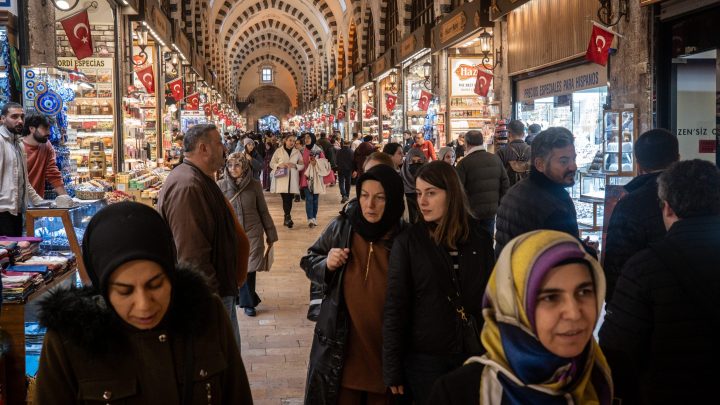
Turkey raises interest rates to 42.5% to combat high inflation
Turkey raises interest rates to 42.5% to combat high inflation

This story was produced by our colleagues at the BBC.
In Ankara, Turkey, Eren and Ümit Karaduman have their hands full. Parenting 3-year-old twin boys is a job of its own, but the couple also have office jobs. Eren works in human resources at the city’s water company and Ümit is employed by Turkey’s national railway.
Despite their stable income, times are tough. Turkey has been struggling for years to contain inflation, which was north of 60% last month. The traditional cure for high inflation is to raise interest rates. The Turkish central bank did just that again on Thursday, and the prevailing interest rate in the country is now 42.5%.
The steep climb of prices means there’s constant change in how far wages go for the Karadumans and others in Turkey. Prices, especially at the supermarket, are always rising, Eren said.
“Our budget is constantly going into the negative,” she said.
The family spends 90% of their income paying down debt, Eren added. Because prices have been so high for so long, Ümit said the only way to afford anything is to put it on a credit card or take out another loan.
“We’re trying to overcome inflation by spending,” he said. “Even if we don’t need something, we take out loans and buy it with credit cards. We are trying to survive by spending. That’s our goal.”
Annual inflation in Turkey topped out last fall at 85.5%. It finally began to cool after interest rates began rising in June, after President Recep Tayyip Erdogan won reelection and listened to voters who said the economy was their biggest concern.
Though he’s long despised high interest rates, calling them “the mother and father of all evil,” he has allowed them to rise in each of the last six months. While higher rates help cool inflation, they also make borrowing more expensive.
“It is a bitter medicine for sure, until we see a decline in inflation and improvement in purchasing power,” said Selva Demiralp, a former economist at Turkey’s Federal Reserve and a current professor of economics at Istanbul’s Coach University. “Unfortunately, this is a painful process that we are going to go through.”
The higher rates that are the centerpiece of this economic turnaround are working to bring down inflation and cool demand in the economy, she said. But it’s a slow process, and not without risk. For the Karaduman family, a permanent return to economic normalcy would be a welcome change.
“Today, at least for now, we are in the lowest-income group. But in the future, perhaps this will change,” said Ümit. “There’s almost no middle class left in Turkey — almost none. You’re either poor or you’re rich.”
While the family can’t fix Turkey’s economic problems, they can tweak their own finances and hope prices come down soon.
There’s a lot happening in the world. Through it all, Marketplace is here for you.
You rely on Marketplace to break down the world’s events and tell you how it affects you in a fact-based, approachable way. We rely on your financial support to keep making that possible.
Your donation today powers the independent journalism that you rely on. For just $5/month, you can help sustain Marketplace so we can keep reporting on the things that matter to you.











